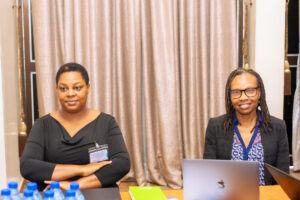News

The Africa Learning Together to Advance Evidence and Equity in Policy-making for Achieving SDGs (LEEPS) Anglophone Hub held a stakeholders’ engagement meeting in Abuja, Nigeria on May 30.
The meeting aimed to sensitise federal and state government officials about institutionalizing evidence and equity in policymaking and assess their capacity for this.
In attendance were Prof. Jesse Uneke, Director of African Institute for Health Policy and Health Systems (AIHPHS) who presented the theoretical arguments for institutionalising use of evidence and gender and intersectionality analysis in public policy and programme decision-making, and practical experiences and lessons, Dr Violet Murunga (AFIDEP), and Dr Ann Nsiima (Makerere University).
Jointly organised by the African Institute for Development Policy (AFIDEP)-led Anglophone Hub LEEPS project and its partner, the AIHPHS, the meeting engaged and built the capacities of officials to advance and institutionalise evidence and equity in policymaking to achieve the SDGs.
Participants assessed their individual and institutional capacity for use of evidence in public policy and programme decision-making using structured instruments.
Dr. Murunga who is also a Research and Policy Analyst at AFIDEP and the LEEPS Project Technical Lead shared AFIDEP’s experience working with African governments and other policy actors. She discussed supporting these entities in formulating and implementing public policies and programs informed by the best available evidence.

On the other hand, Dr Anna Niisima, a Lecturer from the School of Women and Gender Studies at Makerere University in Uganda presented on the importance of gender and intersectional analyses for informing public policy and programmes.
The meeting was attended by more than 100 officials from various government ministries, departments, and agencies in the health, energy, and environment sectors, as well as the National Assembly.
Attendees expressed a strong need and interest in strengthening their capacity for evidence-informed and equity-centered decision-making in Nigeria’s health, energy, and environment sectors.

